 EN
EN
 PT
PT
Discovering the city of progress
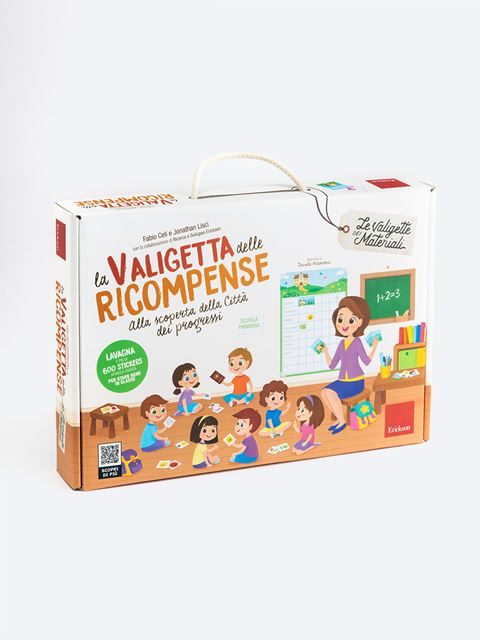
Product: Teaching tools
Trim size in cm: 23,5x32
ISBN: 9788859015864
Publication date: 01/06/2018
Suitable for: Primary 1st level (ages 6-7), Primary 2nd level (ages 8-10)
REQUEST A SAMPLE OR MORE INFORMATION
Children’s behaviour in the classroom depends on many factors: from their motivation, to their ability to control their emotions… to how the teacher speaks to them.
Based on the principles of the token economy, The Rewards Briefcase helps the teachers better structure his/her intervention in the classroom, thanks to a series of ready-to-use materials:
• the rules and the contract, to formalize everyone’s commitment;
• a colourful, washable board, because the token economy works better if it is also “nice to look at”;
• stickers with goals and levels, to give the children clear objectives;
• passports, where positive reinforcement stamps can be put;
• city stickers, to attach to the board when a goal is reached;
• feeling stickers, for emotional self-evaluation;
• warning stickers, in case someone breaks the rules;
• goal stickers, to put on the board when all objectives have been reached.
The rewards briefcase is composed of:
• rules and a contract, to formalize everybody’s effort;

Feel good in class with the token economy!
Created by psychologists Fabio Celi and Jonathan Lisci, this briefcase helps teachers structure and manage their students’ behaviour.
Children’s behaviour in the classroom environment depends on many factors: from their temperament, to their motivation, to their ability to control their emotions, to how they are raised at home, to how the teacher speaks to them, to the behaviour of the other children in class…
Based on the principles of the token economy, The Rewards Briefcase helps the teachers better structure his/her intervention in the classroom, thanks to the series of materials it contains.
What is the “Token economy”
The “token economy” can be of great help in encouraging and assisting a child to improve his or her behaviour in class.
The token economy is essentially based on two concepts. Concept number one refers to everything that a teacher can do prior to the student’s behaviour: establish and communicate clear, personalized and reasonable objectives to the child. Concept number two refers to everything that a teacher can do after the student’s behaviour: reinforce it (with lots of conviction!) when it is correct and punish it (very cautiously!) when it is not.
The token is a symbolic reinforcement which signals to the children that they have reached their mini-goal. If the child behaves well, he/she earns a token. If the child misbehaves, he/she loses it.
Materials in the rewards briefcase
The rewards briefcase can help teachers better structure their interventions thanks to a series of materials that it contains. Here is what is inside:

The board
The board, to be hung in class, is used to apply the token economy program. On the board, the children’s names and the behaviour objectives to be reached are written. Beside these, the token stickers are placed (from 1 to 10), as the children gradually earn them through correct behaviour. There is also a place on the chart for “social reinforcer” stickers (thumbs up, victory symbol, trophy, fireworks) and warning stickers in case negative behaviour occurs (yellow card and red card). Moreover, each child can add a feeling sticker for the day, as a self-evaluation tool (sad face, happy, angry…).
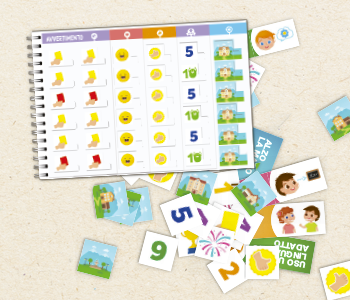
Sticker book
Contains more than 600 stickers to place on the board (stickers with behaviour objectives, tokens, “social reinforcer” stickers, warning stickers, and feeling stickers).
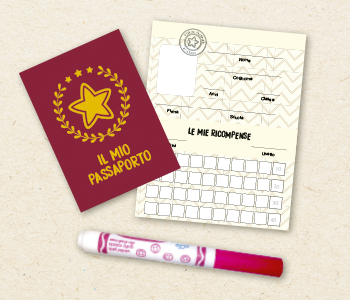
Passport and marker-stamper
A passport for each child to keep track of the tokens earned by using the special marker-stamper.
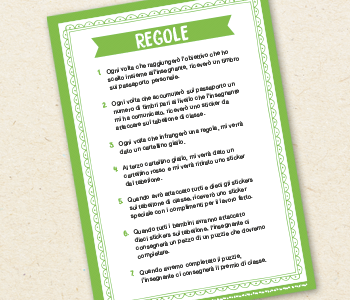
The rules
Before starting, it is important to share the “rules of the game” with the children. This is that the rules sheet is for. It explains the procedure (when to put a stamp in the passport, how to earn tokens, how tokens can be lost, what happens when a rule is broken…)
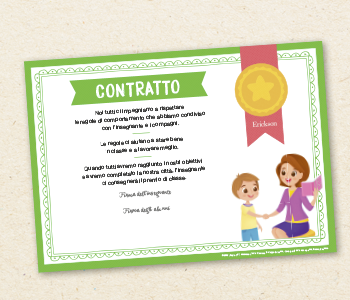
The contract
It formalizes the commitment that the students make together with the teacher and classmates to respect the behaviour rules that have been shared. This should be hung in class alongside the board and the rules.
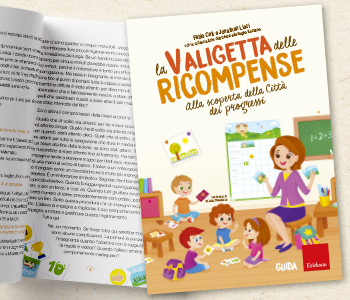
The teacher’s guide
The guide contains indications for the teacher for the proper use of the tools found in the rewards briefcase.
Some helpful hints before starting
The authors
Fabio Celi Psychologist, psychotherapist, director of the O.U.C. (Operative Unit Complex) of Psychology for USL Toscana northwest, he is professor of clinical psychology at the Universities of Parma and Pisa.
Jonathan Lisci Psychologist, psychotherapist and socio-educational worker, he deals with children with hyperactivity and relationship difficulties.